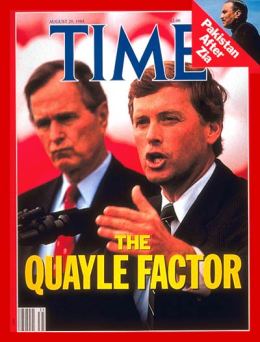
As a Vice President, former congressman and onetime director of the CIA, George H.W. Bush was a consummate Washington insider. But in seeking to move from the Naval Observatory to the White House as Ronald Reagan’s successor, he wanted to introduce a fresh, young face as his running mate. Ultimately, however the gambit backfired — and the hasty, last-minute choice of an untested senator from Indiana was met with almost immediate criticism.
Bush’s hopes for a buoyant bounce from that speech were sacrificed on the altar of Dan Quayle, the man he had selected only two days earlier to be his running mate. The surprise choice, and the way it was handled, revealed some of the weaknesses of Bush’s approach to governance — from a crippling fear of leaks to a distaste for face-to-face confrontation. At one point, only hours before Bush’s acceptance speech, campaign aides considered the possibility that Quayle might be dumped from the ticket. Although Quayle survived the initial storm, there were strong indications that the Quayle factor could haunt the Republican team right through to Nov. 8.





